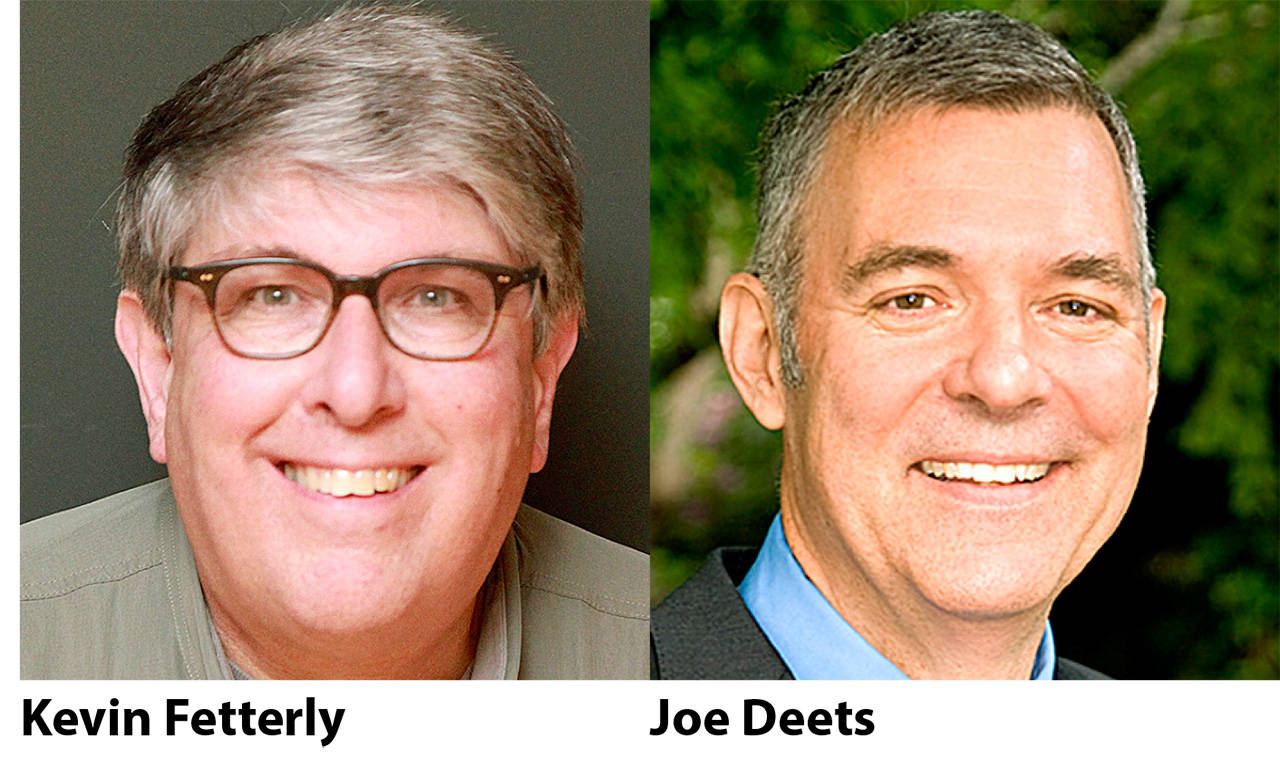Joe Deets has pumped a lot of outside energy into Bainbridge Island City Hall.
Now, he wants to give it a jumpstart from the inside.
Kevin Fetterly hopes to bring an engineer’s problem-solving skills to the city council.
Part of that is knowing when to pull the plug.
Deets and Fetterly are the two candidates in the North Ward, District 7 council race. Both hope to get the nod from voters next Tuesday to fill the position now held by Councilman Val Tollefson, who decided against seeking a second term.
Deets, 60, has lived on the island since 2000. It’s the place where he’s lived the longest in his life, he said.
Deets, a consultant for a solar energy firm, cofounded the nonprofit Community Energy Solutions, an activist nonprofit that helped create clean energy projects and programs across Washington state.
On Bainbridge, Deets helmed the solar panel projects at Bainbridge city hall and Sonoji Sakai Intermediate School. “In both of the projects neither the city nor the school paid any money,” he said.
Those no-cost solutions are a few of the examples he points to as his commitment to his community. Now, there’s a chance to do more.
“I see our island at a crossroads,” Deets said, pointing to the fast growth of our across-the-water neighbor of Seattle.
“Things that we hold dear — our small town, our rural nature — are at risk. Our meadows, our forests, our water. Our very ability to afford to live here is at risk,” he said.
Leaders are needed who can take a vision and put it into action, Deets said, as well as skilled listeners and collaborators.
Fetterly, who, like his opponent, is taking his first shot at elected office, has been an islander for a few summers longer than Deets.
An electrical engineer, Deets, 63, was opposed to the proposed takeover of Puget Sound Energy by the city as a too costly idea that failed to meet its promise of “green power” for Bainbridge.
The fact that the city spent $100,000 on exploring the creation of a city electric company is just another entry on a long list of spendy stuff the city has had in mind lately.
“The Island Power deal, $100 million-plus dollar purchase. We’ve got this garage that’s going to run $15 million to $25 million; somehow the police station went from $7 (million) to $32 (million).
“Something’s broken about the way we manage our expectations of our programs,” Fetterly said. “They bloom out of control.”
His engineer’s mind comes at it from a different angle, he said.
“I want to bring some quantitative thinking into the city council; to filter out ideas that can’t possibly work, before they get too far down the road.”
The race for the North Ward seat has been largely remarkable for its level of agreement between the two candidates.
Both oppose the controversial “Bridge to Nowhere” biker/walker span over Highway 305, but support roadside improvements for bicyclists and pedestrians. Both are concerned about the cost of multiple capital projects on taxpayers, and say that projects such as a proposed parking garage in downtown Winslow will have to be decided on their own merits.
Both also want to see progress made on affordable housing.
“Is there an issue here? Yes,” Deets said.
It’s come up repeatedly in his talks with Bainbridge voters. “The ability of people to afford to live here — I am hearing that loud and clear,” he said.
The city has no requirements on developers to build affordable housing, Deets said, and regulations need to be crafted to create long-term affordable housing when new homes are constructed.
“It needs to be permanent, work/income qualified, so people who work here can afford to stay here,” he said.
Developing the city-owned Suzuki property into a neighborhood with low-cost homes is part of the solution, Deets said.
Fetterly, however, notes that the agreement that’s been put forward by the city’s chosen developer of the Suzuki property offers no iron-clad guarantee that the new neighborhood, once finally built, will include affordable homes.
That’s one of the few areas where Fetterly and Deets part opinion.
“We disagree,” Fetterly said.
“Just last week we had a debate and I stated that the Olympic Property [Group] proposal was a raw deal for the city. It doesn’t guarantee any affordable housing.”
“If you read the term sheet…there’s no guarantees,” Fetterly said.
Fetterly noted the proposed agreement states that if financing cannot be raised by the nonprofit housing groups that hope to build homes on the property, the lots will be sold off to private developers.
If affordable housing is a primary goal for the city and its Suzuki property, Fetterly said, the development agreement needs to be changed to make sure that happens.



